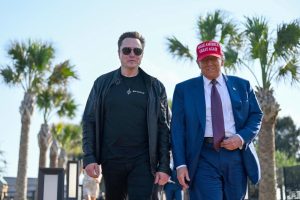California, we often hear, is a lousy place to do business. It’s riddled with needless regulations that make surviving hard for businesses.
Related Articles
Elias: California’s pendulum swings back and forth on crime and punishment
Elias: JD Vance’s Bay Area connections all but guaranteed him his veep post
Elias: Proposition results show voters less liberal than politicians
Those are the words of this state’s detractors, who delight in noting that before this year, California had slight population declines for a while. Some of that was spurred by the movement of white collar workers toward operating from home, which began during the COVID-19 pandemic. Corporate headquarters have departed the state in droves too.
If all that’s true, though, why is California still carrying the national economy? This may come as a surprise, but it’s true. With a gross domestic product (GDP, the total value of all goods and services produced in a place) of $4.08 trillion, California far outpaces No. 2 Texas, which comes in with a GDP of $2.69 trillion — a difference just about proportional to the populations of both states.
California’s GDP accounts for more than 17% of America’s and makes this the No. 5 economy in the world, behind only the entire United States, followed by China, Japan and Germany. California’s share of national GDP stands far above its 12% share of America’s populace.
Here’s a little-publicized secret behind the ballyhooed corporate defections: Companies like Tesla, Toyota and Chevron, with headquarters now elsewhere, still conduct huge parts of their operations here. For Tesla and Toyota, it’s far more than in any other state, including Texas, now home to their head offices.
Here’s another surprise for the many folks who love to denigrate this state, suggesting it only survives economically because of its salubrious climate: Of the 15 states with the largest GDPs, according to the U.S. Bureau of Economic Analysis, five are governed by the GOP, while 10 have Democratic governors.
Those include New York, Illinois, Pennsylvania, New Jersey, North Carolina, Washington, Massachusetts, Michigan and Colorado. Together, the top 15 states account for about 90% of America’s economy. The upshot is that much of what Donald Trump said to denigrate California and other “blue” states during his highly vocal 2024 campaign was false.
It turns out that when a major business moves its headquarters elsewhere, that makes only a small dent in California’s huge economy. In fact, when America does well, it’s largely because California does far better than most of the world.
Never mind that real estate and energy cost more here than almost anywhere else (energy costs are higher in Alaska and Hawaii while real estate costs are higher only in Hawaii). California still produces far more than its fair share of goods and services and is therefore hugely responsible for keeping the U.S. economy the world’s strongest.
All that also ignores the fact that most major industrial innovations of the last 50 years originated in California, from electric cars and smartphones to artificial intelligence. There’s evidence for all this in county GDP ratings too.
For example, two of the five most productive counties in America are in California. Los Angeles and Santa Clara counties together produce more than a fifth of the economic activity in the nation’s 23 wealthiest counties.
Meanwhile, just seven of those 23 most productive counties are in states Trump carried in any of the last three presidential elections. Of those seven, two Texas counties — Harris (Houston) and Travis (Austin) have long been Democratic islands in the Texas Republican red sea.
Los Angeles County, for one example, produced more this year than the combined total of Dallas County, Texas; Maricopa County, Arizona (Phoenix); Fulton County, Georgia (Atlanta); and Philadelphia County, Pennsylvania.
Equally significant are the U.S. Bureau of Economic Analysis comparisons of California county GDPs with other nations. Los Angeles County productivity tops Switzerland. Santa Clara County, home of Silicon Valley, produces more than Pakistan, which has about 100 times as many residents.
We are talking here about companies like Google and Sony Studios, Snapchat and Hewlett-Packard, Netflix and Hulu, all spinning off huge amounts of economic activity. None of this will stop Trump from denigrating California, but he must depend on this state nevertheless if he wants to achieve any kind of economic success in his new term.
Email Thomas Elias at tdelias@aol.com, and read more of his columns online at californiafocus.net.












